七下英语笔记Unit1-6
2013人教版英语七年级下册Unit1-Unit6短语及重点句型
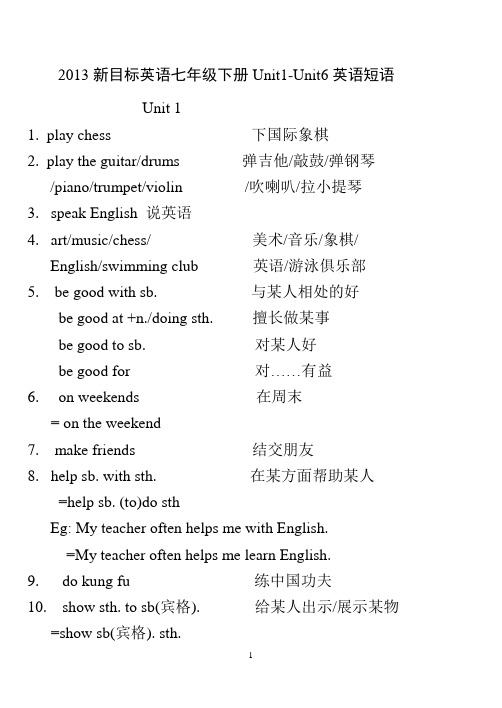
2013新目标英语七年级下册Unit1-Unit6英语短语Unit 11. play chess 下国际象棋2. play the guitar/drums 弹吉他/敲鼓/弹钢琴/piano/trumpet/violin /吹喇叭/拉小提琴3. speak English 说英语4. art/music/chess/ 美术/音乐/象棋/English/swimming club 英语/游泳俱乐部5. be good with sb. 与某人相处的好be good at +n./doing sth. 擅长做某事be good to sb. 对某人好be good for 对……有益6. on weekends 在周末= on the weekend7. make friends 结交朋友8. help sb. with sth. 在某方面帮助某人=help sb. (to)do sthEg: My teacher often helps me with English.=My teacher often helps me learn English.9. do kung fu 练中国功夫10. show sth. to sb(宾格). 给某人出示/展示某物=show sb(宾格). sth.11. need (sb) to do sth. 需要(某人)去做某事12. be in 参加;穿戴;在家13. call sb. at (电话号码) 拨……给某人打电话14. rock band 摇滚乐队15. Musician wanted for rock band. 摇滚乐队招聘音乐人16. a little + 不可数名词一点儿……Unit 21. what time 几点2. go to school 去上学3. get up 起床4. take a shower 洗淋浴5. eat breakfast/lunch/dinner 吃早饭(午饭、晚饭)= have breakfast/lunch/dinner6. brush one’s teeth 刷牙7. get to 到达8. go to work 去上班go home 回家9. get dressed 穿上衣服10. take a walk 散步11. at night 在晚上12. half past +基数词……点半13. a quarter to +基数词差一刻到……点14. get home 到家15. go to bed 去睡觉16. in the morning/ afternoon/evening 在上午(下午、晚上)17. do one's homework 做家庭作业18. from…to…从…到…(指时间或地点)Eg:We study at school from Monday to Friday.He runs from his house to his school.19. at a radio station 在一家广播电台20. be late for…迟到Eg: Don’t be late for class. 不要上课迟到。
英语七下1一5单元笔记

英语七下1一5单元笔记The English 7 Unit 1-5 notes cover a range of topics that are essential for students to understand in order to improve their English language skills. These units cover various aspects of grammar, vocabulary, reading, writing, and speaking, which are all crucial components of language learning. By studying these units, students can enhance their ability to communicate effectively in English and develop a solid foundation for further language learning.In Unit 1, students learn about the present simple tense, which is used to talk about habits, routines, and general truths. This tense is fundamental to English grammar and is used in everyday conversation. By understanding how to use this tense correctly, students can express themselves more clearly and accurately when communicating in English. Additionally, students learn about adverbs of frequency, which provide more information about the frequency of an action, further enhancing their ability to express themselves in English.Moving on to Unit 2, students delve into the world of literature and explore different types of writing, such as narratives, poems, and plays. This unit offers valuable insights into the art of storytelling and allows students to appreciate the creativity and imagination that goes into crafting written works. By studying these literary forms, students can broaden their understanding of language and gain inspiration for their own writing endeavors. Moreover, this unit encourages students to develop their critical thinking skills by analyzing and interpreting various literary works.In Unit 3, students focus on expanding their vocabulary and learning how to use context clues to infer the meaning of unfamiliar words. Vocabulary acquisition is a crucial aspect of language learning, and by building a strong vocabulary, students can become more proficient in reading, writing, and speaking. This unit also introduces students to the concept of word formation, which involves understanding the structure and origins of words. By grasping the principles of word formation, students candecipher the meanings of unfamiliar words and expand their lexical repertoire.Unit 4 delves into the realm of reading comprehension, where students learn how to extract information from texts, make inferences, and analyze the author's purpose. These skills are essential for understanding written material in English and are valuable for academic and real-world contexts. By honing their reading comprehension skills, students can engage with a wide range of texts, fromliterary works to informational articles, and gain a deeper understanding of the content. Furthermore, this unit emphasizes the importance of critical reading, whichinvolves evaluating and questioning the material being read.Finally, Unit 5 focuses on speaking and listeningskills, which are vital for effective communication. Students learn how to engage in conversations, expresstheir opinions, and listen actively to others. These skills are essential for everyday interactions and are valuable in both personal and professional settings. By practicing speaking and listening exercises, students can improvetheir fluency, pronunciation, and overall communicative competence in English. Additionally, this unit encourages students to engage in group discussions and collaborative activities, fostering a sense of community and teamwork in the language learning process.Overall, the English 7 Unit 1-5 notes offer a comprehensive and holistic approach to language learning, covering grammar, vocabulary, reading, writing, speaking, and listening. By studying these units, students candevelop a strong foundation in English and build essential skills that are crucial for effective communication and academic success. The diverse range of topics covered in these units provides students with a well-rounded understanding of the English language, equipping them with the tools they need to navigate the complexities oflanguage and express themselves with confidence and clarity.。
七年级下册英语第一单元笔记整理
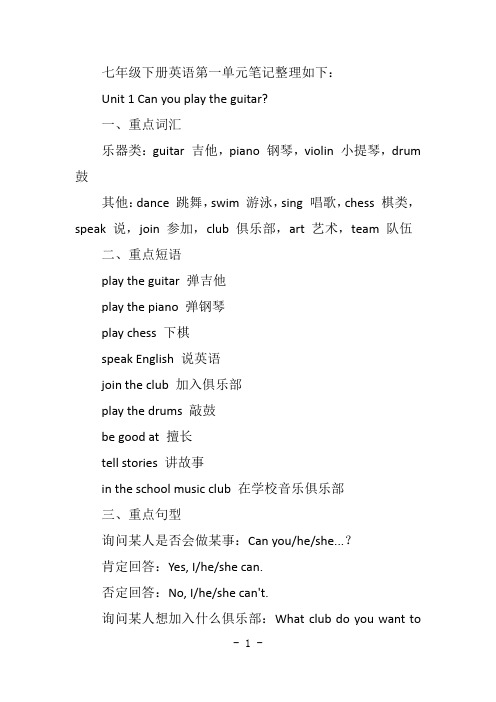
七年级下册英语第一单元笔记整理如下:Unit 1 Can you play the guitar?一、重点词汇乐器类:guitar 吉他,piano 钢琴,violin 小提琴,drum 鼓其他:dance 跳舞,swim 游泳,sing 唱歌,chess 棋类,speak 说,join 参加,club 俱乐部,art 艺术,team 队伍二、重点短语play the guitar 弹吉他play the piano 弹钢琴play chess 下棋speak English 说英语join the club 加入俱乐部play the drums 敲鼓be good at 擅长tell stories 讲故事in the school music club 在学校音乐俱乐部三、重点句型询问某人是否会做某事:Can you/he/she...?肯定回答:Yes, I/he/she can.否定回答:No, I/he/she can't.询问某人想加入什么俱乐部:What club do you want tojoin?谈论某人擅长什么:I/He/She is good at...询问某人擅长什么:What are you good at?谈论某人可以做什么:I/He/She can...四、语法重点情态动词can的用法:表示能力,意为“能,会”。
在一般现在时中,当主语为第三人称单数时,使用“can + 动词原形”。
否定形式为“can't”。
疑问句形式将“can”提前到句首。
特殊疑问句:What club do you want to join? 你想加入什么俱乐部?What are you good at? 你擅长什么?五、拓展知识了解不同乐器的英文名称,学习如何用英语描述自己的兴趣和特长,如:“I can play the guitar and I am good at it.”(我会弹吉他,而且我很擅长。
七年级下册英语1到6单元知识点手抄报

七年级下册英语1到6单元知识点手抄报一、单元一:Unit 1 What’s the matter?1. 词汇及短语illness 疾病headache 头痛stomachache 胃疼toothache 牙疼fever 发烧cough 咳嗽2. 语法How are you feeling? 你感觉怎么样?What’s the matter? 怎么啦?I have a headache. 我头痛。
What should I do? 我该怎么办?3. 句型—What’s the matter?—I have a headache.二、单元二:Unit 2 How often do you exercise?1. 词汇及短语often 经常地usually 通常sometimes 有时hardly ever 几乎从不exercise 锻炼healthy 健康的2. 语法How often do you exercise? 你多久锻炼一次?I exercise three times a week. 我每周锻炼三次。
3. 句型—How often do you exercise?—I exercise three times a week.三、单元三:Unit 3 Could you please clean your room?1. 词汇及短语clean 打扫make the bed 整理床铺take out the trash 扔垃圾sweep the floor 扫地mop the floor 拖地2. 语法Could you please clean your room? 你能打扫一下你的房间吗?Sure, I’d be happy to. 当然,我愿意做。
3. 句型—Could you please clean your room?—Sure, I’d be happy to.四、单元四:Unit 4 What’s your favourite food?1. 词汇及短语favourite 最喜欢的food 食物healthy 健康的unhealthy 不健康的fruit 水果vegetable 蔬菜2. 语法What’s your favourite food? 你最喜欢的食物是什么?My favourite food is pizza. 我最喜欢的食物是比萨饼。
Unit1-Unit6重点知识归纳人教版七年级英语下册
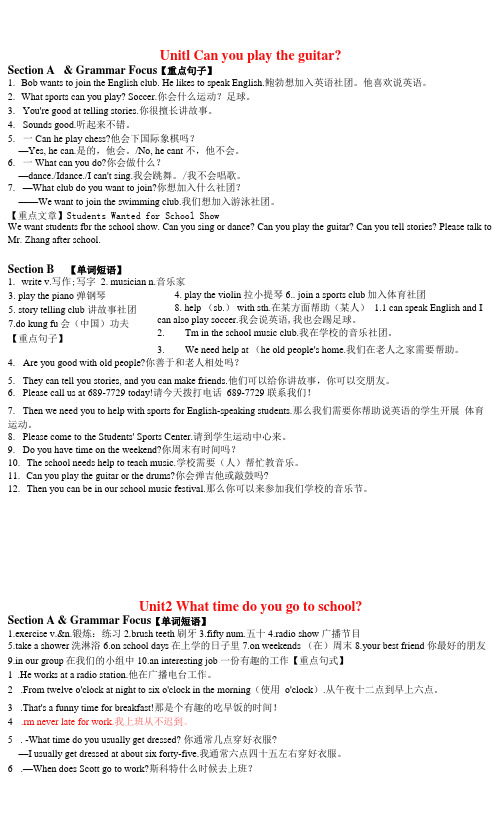
Unitl Can you play the guitar?Section A & Grammar Focus 【重点句子】1.Bob wants to join the English club. He likes to speak English.鲍勃想加入英语社团。
他喜欢说英语。
2.What sports can you play? Soccer.你会什么运动?足球。
3.You're good at telling stories.你很擅长讲故事。
4.Sounds good.听起来不错。
5. 一Can he play chess?他会下国际象棋吗?—Yes, he can.是的,他会。
/No, he cant 不,他不会。
6. 一What can you do?你会做什么?—dance./Idance./I can't sing.我会跳舞。
/我不会唱歌。
7. —What club do you want to join?你想加入什么社团?——We want to join the swimming club.我们想加入游泳社团。
【重点文章】Students Wanted for School ShowWe want students fbr the school show. Can you sing or dance? Can you play the guitar? Can you tell stories? Please talk to Mr. Zhang after school.Section B 【单词短语】1. write v.写作;写字2. musician n.音乐家4. play the violin 拉小提琴6.. join a sports club 加入体育社团 8. help (sb.) with sth.在某方面帮助(某人) 1.1 can speak English and I can also play soccer.我会说英语,我也会踢足球。
七年级英语下册1-6单元知识点总结(完整-详细)
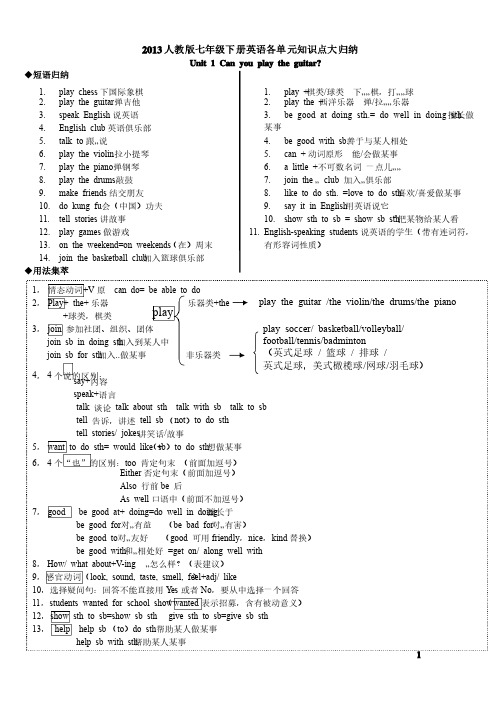
11, 情态动词+V 原 can do= be able to do 2, Play+ the+ 乐器乐器 乐器类+the +球类,棋类球类,棋类3, join 参加社团、组织、团体参加社团、组织、团体join sb in doing sth 加入到某人中加入到某人中join sb for sth 加入加入..做某事做某事 非乐器类非乐器类 4, 4个说的区别:个说的区别: say+内容内容speak+语言语言talk 谈论谈论 talk about sth talk with sb talk to sb tell 告诉,讲述告诉,讲述 tell sb (not )to do sth tell stories/ jokes 讲笑话/故事故事 5, want to do sth= would like +(sb )to do sth 想做某事想做某事6, 4个“也”的区别:too 肯定句末肯定句末 (前面加逗号)(前面加逗号) Either 否定句末(前面加逗号)否定句末(前面加逗号) Also 行前be 后 As well 口语中(前面不加逗号)口语中(前面不加逗号) 7, good be good at+ doing=do well in doing 擅长于擅长于 be good for 对…有益对…有益 (be bad for 对…有害)对…有害) be good to 对…友好对…友好 (good 可用friendly ,nice ,kind 替换)替换) be good with 和…相处好=get on/ along well with 8, How/ what about+V-ing …怎么样?(表建议) 9,感官动词(look, sound, taste, smell, feel )+adj/ like 10,选择疑问句:回答不能直接用Y es 或者No ,要从中选择一个回答,要从中选择一个回答 11,students wanted for school show (wanted 表示招募,含有被动意义)表示招募,含有被动意义) 12,show sth to sb=show sb sth give sth to sb=give sb sth 13, help help sb (to )do sth 帮助某人做某事帮助某人做某事help sb with sth 帮助某人某事帮助某人某事帮助某人某事 play play soccer/ basketball/volleyball/ football/tennis/badminton (英式足球(英式足球 / 篮球篮球 / 排球排球 / 英式足球,美式橄榄球/网球/羽毛球)play the guitar /the violin/the drums/the piano 2 ◆典句必背1. Can you draw? Yes, I ca n . / No, I can’t.n. / No, I can’t.2. What club do you want to join? I want to join the chess club. 3. You can join the English club. 4. Sounds good./That sounds good. 5. I can speak English and I can also play soccer. 6. Please call Mrs. Miller at 555-3721. ◆话题写作 Dear Sir, I want to join your organization (组织) to help kids with sports, music and English. My name is Mike. I am 15 years ol I’I’m a student in No. 1 Middle school. I can play the guitar well. I can sing many songs. I can swim and speak English we m a student in No. 1 Middle school. I can play the guitar well. I can sing many songs. I can swim and speak English we I think I can be good with the kids. I also do well in telling stories. I hope to get your letter soon. Y ours, Mike Unit 2 What time do you go to school? ◆短语归纳1. what time 几点几点几点2. go to school 去上学去上学3. get up 起床起床起床4. take a shower 洗淋浴洗淋浴5. brush teeth 刷牙刷牙刷牙6. get to 到达到达到达 7. do homework 做家庭作业做家庭作业做家庭作业 8. go to work 去上班去上班 9. go home 回家回家回家10. eat breakfast 吃早饭吃早饭吃早饭 11. get dressed 穿上衣服穿上衣服穿上衣服 12. get home 到家到家到家 13. either…or… 要么…要么… 14. go to bed 上床睡觉上床睡觉 15. in the morning/ afternoon/ evening 在上午/下午/晚上晚上 16. take a walk 散步散步 17. lots of=a lot of 许多,大量许多,大量 18. radio station 广播电台广播电台广播电台 19. at night 在晚上在晚上在晚上 20. be late for=arrive late for 迟到迟到 ◆用法集萃◆典句必背1. What time do you usually get up? I usually get up at six thirty. 2. That’s a funny time for breakfast.3. When do students usually eat dinner? They usually eat dinner at a quarter to seven in the evening. 4. In the evening, I either watch TV or play computer games. 5. At twelve, she eats lots of fruit and vegetables for lunch.. 1. at + 具体时间点具体时间点具体时间点 在几点(几分)在几点(几分)2. eat breakfast/ lunch/dinner 吃早饭/午饭/晚饭晚饭3. thirty\half past +基数词基数词 ……点半点半4. fifteen\a quarter to +基数词基数词 差一刻到……点5. take a/an +名词名词 从事……活动6. from …to … 从……到……7. need to do sth 需要做某事需要做某事14,busy : be busy doing sth/ be busy with sth 忙着做某事忙着做某事 15,need :need sb. to do sth. 需要某人做某事需要某人做某事 16,be free= have time 有时间有时间 17,have friends= make friends 交朋友交朋友交朋友 18,call call sb at +电话号码电话号码1. take… to …= go to … by…乘…去…2. How do / does (sb)get to …? …是怎样到…的?的?3. How far is it from … to …? 从…到…有多远?有多远?4. It takes sb. some time to do sth. 做某事花费某人多长时间。
初中英语人教新目标七年级下册期中考点归纳(1-6单元)

七年级英语下册期中考点归纳Unit 1 Can you play the guitar? 【短语归纳】1.play chess 下国际象棋2.play the guitar 弹吉他3.speak English 说英语4.English club 英语俱乐部5.talk to 跟…说6.play the violin 拉小提琴7.play the piano 弹钢琴8.play the drums 敲鼓9.make friends 结交朋友10.do kung fu 练 (中国) 功夫11.tell stories 讲故事12.play games 做游戏13.on the weekend/on weekends 在周末【用法】1.play +棋类/球类下……棋,打……球2.play the +西洋乐器弹/拉……乐器3.be good at doing sth.= do well in doing sth.擅长做某事4.be good with sb.和某人相处地好5.need sb.to do sth.需要某人做某事6.can + 动词原形能/会做某事7.a little + 不可数名词一点儿……8.join the …club 加入…俱乐部9.like to do sth.=love to do sth. 喜欢/喜爱做某事Unit 2 What time do you go to school? 【短语归纳】1.what time 几点2.go to school 去上学3.get up 起床4.take a shower 洗淋浴5.brush teeth 刷牙6.get to 到达7.do homework 做家庭作业8.go to work 去上班9.go home 回家10.eat breakfast 吃早饭11.get dressed 穿上衣服12.get home 到家13.either…or…要么…要么…14.go to bed 上床睡觉15.in the morning/ afternoon/ evening 在上午/下午/晚上16.take a walk 散步17.lots of=a lot of 许多,大量18.radio station 广播电台19.at night 在晚上20.be late for=arrive late for 迟到【用法】1.at + 具体时间点,在几点(几分)12.eat breakfast/ lunch/dinner 吃早饭/午饭/晚饭3.thirty\half past +基数词……点半4.fifteen\a quarter to +基数词差一刻到……点5.take a/an +名词从事……活动6.from …to …从……到……7.need to do sthUnit 3 How do you get to school? 【短语归纳】1.get to school 到达学校2.take the subway 乘地铁3.ride a bike 骑自行车4.how far 多远5.from home to school 从家到学校6.every day 每天7.take the bus 乘公共汽车8.by bike 骑自行车9.bus stop 公共汽车站10.think of 认为11.between … and …在…和…之间12.one 11-year-old boy 一个11岁的男孩13.play with …和…玩e true 实现15.have to 不得不【用法】1.take… to …= go to … by…乘…去…2.How do / does (sb)get to …? …是怎样到…的?3.How far is it from … to …? 从…到…有多远?4.It takes sb.some time to do sth. 做某事花费某人多长时间。
七年级英语人教版下册Unit1-Unit6知识梳理
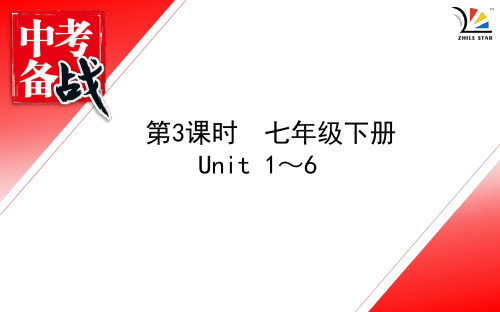
第3课时七年级下册Unit 1~6重点单词1. 唱歌v. ____→ ______n.歌手,歌唱家→ ____(过去式) 2.游泳v. _____→ ________n.游泳者→ _____(过去式) 3.说某种语言;说话v. _____→ _______n.演讲者→_____(过去式)→ _______(过去分词)4.小提琴n. _____→ _______n.小提琴演奏者sing singer sangswim swimmer swamspeak speakerspoke spokenviolin violinist5.牙齿n. _____→ _____(复数)6.一半n. ____→ ______(复数)7.生命;生活n. ___→ ____(复数)8.远的adj. ___→ _______/ _______(比较级)→ _______/ _______(最高级)9.横过;越过v. _____→ ______prep.横过________n.十字路口tooth teethhalf halveslife livesfar farther further farthest furthestcross acrosscrossing10.真的;符合事实的adj. ____→ _____adv.真正;确实→ _____n.事实;真相11.穿;戴v. _____→ _____(过去式)→ ______(同义词组) 12. 重要的adj. _________→ __________n.重要→___________adv. 重要的是→___________(反义词)不重要的13.带来v. _____→ _______(过去式)→____(反义词)带走;拿走true trulytruthwear wore put onimportant importanceimportantlyunimportantbring broughttake14.记得v. _________→ ______(反义词)忘记15.遵循;跟随v. ______→ ________adj. 下面的16.运气n. ____→ _____adj. 好运的→ _______(反义词)不幸的______adv. 幸运地→ _________(反义词)不幸地17.睡觉v. _____→ ______adj. 睡着的______adj. 瞌睡的remember forgetfollow followingluck lucky unluckyluckily unluckilysleep asleep sleepy18.危险n. _______→ _________adj. 危险的→ ____(反义词)安全的19.儿童n. _____→ ________(复数) 20.希望v. /n. ____→ ______(复数)danger dangeroussafechild childrenwish wishes重点短语1. 下国际象棋_________2.说英语____________3.擅长……____________ 4.练功夫__________5.让某人看某物_____________. 6.跟……说_________play chessspeak Englishbe good at. . .do kung fushow sb. sthtalk to. . .7.弹钢琴_____________8.善于应付……;对……有办法___________ 9.和……交朋友________________10.在某方面帮助某人___________11.在周末_________________________ 12.淋浴____________13.……要么……要么_____________play the pianobe good withmake friends withhelp sb. withon/at weekends/the weekendtake a showereither. . . or. . .14.大量,许多___________15.乘地铁______________16.骑自行车__________ 17.在……和……之间__________________ 18.实现;成为现实_________19.起床;站起______20. 听……__________quite a lot oftake the subwayride a bikebetween. . . . and. . . .come trueget uplisten to. . .21.在工作日/上课日___________ 22.清洗餐具____________23.铺床____________24.对某人严格要求______________. 25.遵守规则______________ 26.稍微;有点儿_______27.来自__________on weekdaysdo the dishesmake the bedbe strict with sbfollow the ruleskind ofcome from28.好运的象征___________________ 29.处于极大的危险中________________ 30.砍倒;砍伐________31.由……制成__________32.做作业__________________33.散步;走一走__________a symbol of good luckbe in great dangercut downbe made ofdo (one's) homeworktake a walk34.认为;想起_______ 35.准时___________ 36.外出(娱乐) ______ 37.迷路_______think of(be) on timego outget lost重点句型1. 我想加入故事俱乐部。
七年级下册1到6单元英语知识点

七年级下册1到6单元英语知识点
以下是七年级下册英语1到6单元的一些主要知识点:
1. Unit 1: Personal Information
-介绍自己的基本信息,如姓名、年龄、国籍等。
-问与回答关于个人信息的问题。
-学习使用形容词来描述自己和他人。
2. Unit 2: School Life
-学习和使用关于学校生活的词汇,如科目、课程表、校园设施等。
-学习描述日常活动和时间表。
-学习使用一般现在时来表达习惯和常规。
3. Unit 3: Hobbies and Interests
-学习和使用关于爱好和兴趣的词汇,如运动、音乐、艺术等。
-学习表达自己的喜好和不喜欢。
-学习使用动词的-ing形式来描述正在进行的活动。
4. Unit 4: Daily Routines
-学习和使用关于日常生活的词汇,如起床、吃早餐、上学等。
-学习描述日常活动的顺序和时间。
-学习使用一般现在时来描述日常例行事务。
5. Unit 5: Food and Health
-学习和使用关于食物和健康的词汇,如水果、蔬菜、饮食习惯等。
-学习表达食物的喜好和不喜欢。
-学习使用情态动词can和should来表达能力和建议。
6. Unit 6: Travel and Transportation
-学习和使用关于旅行和交通的词汇,如旅游景点、交通工具等。
-学习描述旅行计划和行程。
-学习使用一般将来时来表达将来的计划和打算。
人教版七年级英语下册units1-6重点短语和句子含答案
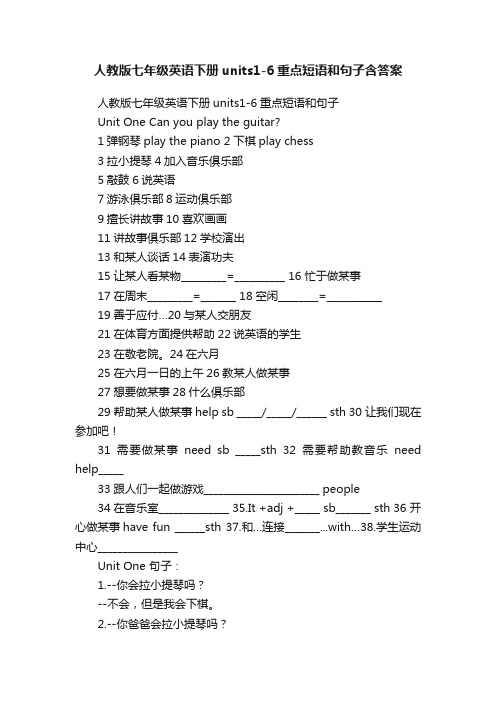
人教版七年级英语下册units1-6重点短语和句子含答案人教版七年级英语下册units1-6重点短语和句子Unit One Can you play the guitar?1弹钢琴play the piano 2下棋play chess3拉小提琴4加入音乐俱乐部5敲鼓6说英语7游泳俱乐部8运动俱乐部9擅长讲故事10喜欢画画11讲故事俱乐部12学校演出13和某人谈话14表演功夫15让某人看某物_________=__________ 16忙于做某事17在周末_________=_______ 18空闲________=___________19善于应付…20与某人交朋友21在体育方面提供帮助22说英语的学生23在敬老院。
24在六月25在六月一日的上午26教某人做某事27想要做某事28什么俱乐部29帮助某人做某事help sb _____/_____/______ sth 30让我们现在参加吧!31需要做某事need sb _____sth 32需要帮助教音乐need help_____33跟人们一起做游戏_______________________ people34在音乐室______________ 35.It +adj +_____ sb_______ sth 36 开心做某事have fun ______sth 37.和…连接_______...with…38.学生运动中心________________Unit One 句子:1.--你会拉小提琴吗?--不会,但是我会下棋。
2.--你爸爸会拉小提琴吗?--是的,他会。
3.--你想加入什么俱乐部?--我想加入艺术俱乐部。
4.我妈妈擅长讲故事。
5.他可以加入讲故事俱乐部。
6.我的弟弟喜欢画画。
7.--你弟弟会干什么?--他会打篮球。
8.那么,你可以参加我们学校的音乐节。
9.张平会说英语还会弹钢琴。
10.我们需要你在运动方面提供帮助。
11.你和老人们相处得好吗?12.我们交朋友吧。
七年级英语下册(1-6)复习提纲-经典教学教辅文档
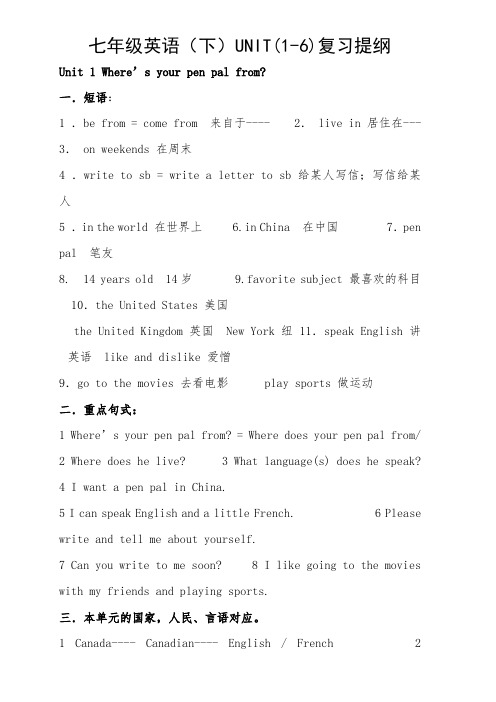
七年级英语(下)UNIT(1-6)复习提纲Unit 1 Where’s your pen pal from?一.短语:1 .be from = come from 来自于---- 2. live in 居住在--- 3. on weekends 在周末4 .write to sb = write a letter to sb 给某人写信;写信给某人5 .in the world 在世界上 6.in China 在中国 7.pen pal 笔友8. 14 years old 14岁 9.favorite subject 最喜欢的科目10.the United States 美国the United Kingdom 英国New York 纽11.speak English 讲英语like and dislike 爱憎9.go to the movies 去看电影play sports 做运动二.重点句式:1 Where’s your pen pal from? = Where does your pen pal from/2 Where does he live?3 What language(s) does he speak?4 I want a pen pal in China.5 I can speak English and a little French.6 Please write and tell me about yourself.7 Can you write to me soon? 8 I like going to the movies with my friends and playing sports.三.本单元的国家,人民、言语对应。
1 Canada---- Canadian---- English / French 2France------ French------French3 Japan------Japanese----Japanese4 Australia----Australian----- English5 the United States------ American---- English6 the United Kingdom---British----- EnghishUnit 2 Where’s the post office?一.A sking ways: (问路)1.Where is (the nearest) ……?(比来的)……在哪里?2.Can you tell me the way to ……?你能告诉我去……的路吗?3.How can I get to ……?我怎样到达……呢?4.Is there …… near here / in the neighborhood? 附近有……吗?5.Which is the way to ……?哪条是去……的路?二.Showing the ways: (指路)1. Go straight down / along this street. 沿着这条街不断走。
七年级英语下册unit1-unit6知识点归纳

七年级下册知识点复习归纳Units 1—6Unit 1 Where’s your pen pal from?1. Be from = come from 来自如:She is from France. 她来自法国。
= She comes from France.2. pen pal 笔友= pen friend3. Write to sb =write a letter to sb 写信给某人Eg. He often writes to his mother on Sunday.6.speak English. 说英语。
“Speak + 某语言”意为“讲……语”。
Eg Can you speak Chinese?注:Speak say tell 和talk 的区别▲say着重指说话的内容,它的宾语可以是名词,代词或宾语从句。
eg: She’s saying , Don’t draw on the wall.她在说“别在墙上画”。
▲speak常指说某种语言,常见的搭配形式有:speak of sth / sb.谈到某事(某人)speak to sb 跟某人讲话Eg. She is speaking to her teacher. 她正在跟她的老师说话。
▲talk意思是“交谈,谈话,着重强调两具之间的相互说话。
常见的搭配有:talk to / with sb 和某人交谈;talk about 谈论……eg: She is talking with Lucy in English. 她正在和露茜用英语交谈。
What are you talking about? 你们在谈论什么?The teacher is talking to him. 老师正在和他谈话。
▲tell常作及物动词,意为“讲述,告诉,动词常跟双宾语。
讲故事常用tell, 即tell a story tell sb sth =tell sth to sb告诉某人某事。
新人教版7年级下册英语unit1- unit6知识点
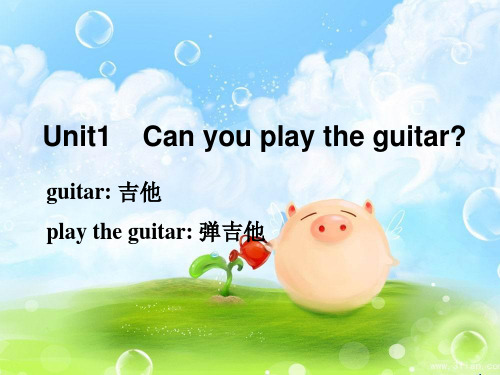
8.需要帮助__________________
9.你有空吗?_____________________
10.你和老人相处的好吗? _________________________________________ 11.给你讲故事_______________________ 12.交朋友_________________ 13.请在今天按7933这个号码打给我们 _________________________________ 14.你忙吗?____________________ 15.放学后________________ 16.在周末______________
Unit1
Can you play the guitar?
guitar: 吉他 play the guitar: 弹吉他
1.你会弹吉他吗?____________________________
2.我会跳舞________________ 3.她会游泳________________ 4.他不会下象棋_______________________________ 5.你妹妹会说英语吗? ___________________________________________ 6.我想加入艺术社团 ___________________________________________ 7.你想加入什么俱乐部? ___________________________________________
____________________________
37.为某人做早饭__________________________
Unit3 How do you get to school?
get to+地点名词 get +地点副词 get to school get home get here get there
仁爱版七年级下册英语u6t1知识点
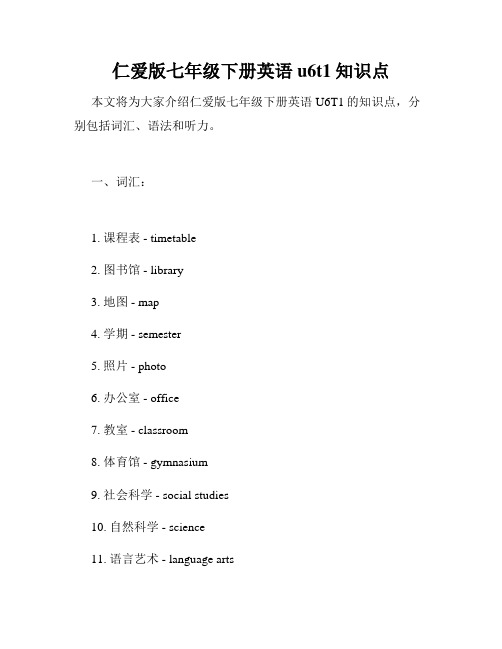
仁爱版七年级下册英语u6t1知识点本文将为大家介绍仁爱版七年级下册英语U6T1的知识点,分别包括词汇、语法和听力。
一、词汇:1. 课程表 - timetable2. 图书馆 - library3. 地图 - map4. 学期 - semester5. 照片 - photo6. 办公室 - office7. 教室 - classroom8. 体育馆 - gymnasium9. 社会科学 - social studies10. 自然科学 - science11. 语言艺术 - language arts12. 音乐 - music13. 美术 - art二、语法:1. 一般现在时 - Present Simple Tense一般现在时表示目前正在发生或经常发生的动作、状态或存在的事情,其句型结构为主语+谓语动词。
例如:I like playing basketball. 我喜欢打篮球。
My brother studies in a university now. 我哥哥现在在读大学。
The library opens at 9:00am every day. 图书馆每天早上9点开门。
2. 进行时 - Present Continuous Tense进行时表示正在进行的动作,其句型结构为主语+be动词(am/is/are)+现在分词。
例如:I am studying English now. 我正在学英语。
She is listening to music at the moment. 她现在正在听音乐。
The students are working on their group project. 学生们正在进行小组项目。
3. 句子结构英语中的句子主要包括主语、谓语、宾语、补语、定语和状语等。
其中,主语和谓语是英语句子的基本要素,它们构成了句子的基本骨架。
例如:My father (主语) works (谓语) in a hospital. 我的父亲在医院工作。
人教版英语七下期中unit1 to-unit6复习重点句子

Important sentences for Unit 1 to unit 61. I can play the guitar and l can also play the piano我会弹吉他也会弹钢琴2. Jack can't do Chinese kung fu and he can’t play the drums, either/ Jack can’t do Chinese kung fu or play the drums. Jack不会中国功夫也不会打鼓3.-Can you swim? -Yes, I can. 你会游泳吗?是的,我会4.-Can she play chess? No, she can’t 她会下棋吗?不,她不会5.-Can you and Tom play the violin? -Yes, we can. 你和汤姆会拉小提琴吗?是的,我们会6.-Can Lily and Jill play the trumpet?-No, they can’t Lily 和Jill会吹小号吗?不,他们不会7. -What can he do?-He can play the guitar. 他会干什么?他会弹吉它。
8.-What club do you want to join?-I want to join the story telling club. Because I am good at telling stories. 你想加入什么俱乐部?我想加入讲故事俱乐部,因为我擅长讲故事9.-What club does your sister want to join? –She wants to join the swimming club.Because wants to learn much/a lot about swimming.你姐姐想要加入什么俱乐部? 她想加入游泳俱乐部,因为她想学习很多关于游泳的事情。
英语七下第1单元短语笔记。

英语七下第1单元短语笔记。
English Phrases for Grade 7, Unit 1Good morning/afternoon/evening! 早上好/下午好/晚上好!How are you?你好吗?I'm fine, thank you. And you?我很好,谢谢。
你呢?Nice to meet you.很高兴认识你。
Nice to meet you, too.我也很高兴认识你。
What's your name?你叫什么名字?My name's ...我叫……Goodbye!再见!See you later!待会儿见!Be careful!小心!Thank you!谢谢!You're welcome!不客气!Sorry, I'm late.对不起,我迟到了。
That's OK.没关系。
Hello!你好!Hi!嗨!This is ...这是……And these are ...而这些是……Is this your pencil?这是你的铅笔吗?Yes, it is. Thank you!是的,谢谢!No, it isn't. Mine is blue.不,不是。
我的是蓝色的。
What about this one? Is this yours?那这个呢?这是你的吗?Yes, that's mine.是的,那是我的。
How do you spell it?你如何拼写它?Can you spell it, please?请你拼写一下好吗?What color is it?它是什么颜色的?It's black and white.它是黑白相间的。
The key is yellow.这把钥匙是黄色的。
The cup is my sister's.这个杯子是我姐姐的。
The jacket is nice.这件夹克很好看。
- 1、下载文档前请自行甄别文档内容的完整性,平台不提供额外的编辑、内容补充、找答案等附加服务。
- 2、"仅部分预览"的文档,不可在线预览部分如存在完整性等问题,可反馈申请退款(可完整预览的文档不适用该条件!)。
- 3、如文档侵犯您的权益,请联系客服反馈,我们会尽快为您处理(人工客服工作时间:9:00-18:30)。
Unit1 Where’s your pen pal from?1.pen pal =pen friend three pen pals 三个笔友2.来自(1) be from My mother is from France.划Where is your mother from?(2) come from My mother comes from France.划Where does your mother come from?3.country 国家c.n. eg: How many countries are there in the world? city 城市c.n.4. language c.n. What languages can you speak?How many languages can he speak?5.live 不及物动词live in +地点My mother lives in Toronto.划Where does your father live ?live with sb. 和某人住在一起My father lives with my grandmother.划Who does your father live with?who疑问代词Where疑问副词出现无介词where答语必须是介宾短语6. world (1) in the world 在世界上(2) all over the world 全世界7. like-dislike c.n. likes and dislikes like/dislike doing/ to do sth.1.Where+be+主语+from?答:主语+be +from+地点.Where+助词+主语+come from? 答:主语+come/comes from+地点.2.Where+助词+主语+live? 答:主语+live/lives in+地点.3.What languages ………?4. It’s too difficult too太,非常;也(句末)5. I have a brother and a sister.一般疑问句:(√)你有一个哥哥和妹妹吗?Do you have a brother and a sister?(×)你有一个哥哥还是一个妹妹?Do you have a brother and a sister?Section1.儿童日语Japanese for kids2.今日法语French for today3.想要一个笔友want a pen pal4.我住在加拿大的多伦多I live in Toronto,Candan.5.在11月in November6.说英语和一点法语speak English and a little French7.喜欢和我的朋友们去看电影like going to the movies with my friends8.在学校in/at school 9.尽快写信给我write to me soon10.征寻笔友pen pal wanted11.写信并告诉我关于你自己write and tell me about yourselfUnit2 Where is the post office?1.About places: office, post office, library (libraries), restaurant (hotel ?), Bank (bank of China), supermarket, street, avenue(路两旁有林荫), park, Bridge (Center Bridge)2.pay v. pay……(money) for sth. Eg: I pay 20 dollars for a bag.花费: spend, cost, take, pay phone3.there→here adv./home 副词出现省略介词go there , come home , go homethere be句型含义:在某处有某物,表示有there问there答(×)there have4.near prep. prep,+ the + n. eg: near the school/park在这附近near here = around here = in the neighborhood5.across prep. eg: across the bridge在……对面across from eg: across from the park穿过across 穿过平面across the bridge/street/riverthrough 穿过空间through the avenue/park/forest6.next to He sits next to me.7.between between A and B 注意冠词8.in front of 在外部空间的前面There is a tree in front of me. in the front of在内部空间的前面The student sit in the front of the classroom.9.in the neighborhood 在………附近10.straight go straight 直走go straight along/down the street 沿着街道走go straight down the avenue 不可直接加地点11.turn v. turn left turn rightturn on 开turn off 关turn up 大turn 小downturn n. It’s your turn 轮到你了turn to page1eg: Spring is coming, the leaves turn green.His face turns red.12.on one’s left/right句型:1.问路①Where is……?②Is there……?③Which is the way to……+地点?④How can I get to……?⑤Do you know the way to……?⑥Can you tell me how I can get to……?=how to get to……?which is the way to……?2.指路①方位介词It’s + 介词短语+ 地点on+街道across from……next to……in the neighborhood near here in front of……behind……between……and……②go straight(顺着), and……③walk on and……④take the first turning and turn left 在第一个路口左转? Thank you all the same.⑤there be 句型就近原则,表示有,在某处有某物问路Is there……? 指路There is + 地点+ 介词短语eg: There is a pay phone across from the bank.There is a supermarket next to the park.There is a restaurant near the post office.There is a restaurant near here/around here/in the neighborhood. near可以直接加地点near here/around here/in the neighborhood位于句尾,不可加地点Section B1.①open adj. 反closed The door is closed. be closedv. 反close Please close the door.②clean→dirty③quiet busy 忙碌的,繁华的 a busy supermarketnoisy 嘈杂的be quiet=keep quiet2.welcome welcome to + 地点welcome here/home3.enjoy sth.doingoneself=have fun=have a good timeHe enjoys himself with his sister.I enjoy myself on weekends.反身代词myself, yourself, himself, herself, yourselves ,ourselves4.take a walk = have a walk = go for a walkwalk v. walk to sp. = go to sp. On foot5.begin ……的开始the beginning of……在……的开始at the beginning of……the beginning of the team/year6.visit visit + 地点参观visit→visitorvisit + 人拜访7.have fun = enjoy oneself = have a good timedoing eg: They have fun playing basketball in the park.8.hungry be hungry9.arrive=get to in 大地点arrive in Beijing /Paris= reach at 小地点arrive at hospital/chao yineg: I arrive in Beijing on time.(准时到达)I get to Beijing on time.I reach Beijing on time.10. way the way to 到……的路the way home在某人去…的路上on one′s way toeg: Which is the way to the hospital?Which is the way home?Which is the way to your home?11. if if引导的状语从句If you are hungry, you can buy some food in the supermarket.主将从现eg: You will play computer games if you finish homework.12. take take a taxi=by taxi13. pass v. turn left after passing the bankpast prep. past= walk past =go throughpass sb.sth.=pass sth.to sb.传、递14.hope v. + to do/that宾语从句I hope pass the exam.I hope (that) you pass the exam. I hope you have a good trip.wish v. +sb. to do sth. I wish you to have a good trip.3a1.Across from the park is an old hotel.倒装句介词短语提前表示强调只要是倒装句,主语在后面2.a small house with an interesting gardenwith①附有China is a country with a long history.②伴随,和……一起She with me goes to the movies.③用write down with the pen④表伴随3.Bridge Street is a good place to have fun.4.I know you are arriving next Sunday.现在进行时态表将来leave, arrive, come5.When you see a big supermarket, turn left.when引导时间状语从句,意思为“当……的时候”Unit 3 Why do you like koalas?1.about animals①a cute koala ②a scary tiger ③an elephant④a strong and friendly elephant ⑤a smart dolphin ⑥a shy panda⑦an ugly lion ⑧a lazy penguin ⑨a beautiful giraffe2.zoo→zoos pianos 以o 结尾+es的词tomato,potato,hero3.map a map of China a map of world4. animal --an animal --animals What animals…………?5.kind of + adj. 有点,稍微= a little + adj. (a little +u.n. 有一点)eg: The panda is kind of shy. = The panda is a little shy.6. south in the south South Africawest9.leaf c.n. →leaves eat leaves10.在白天during the day = in the day在晚上at night = in the eveningEg: He sleeps during the day, but at night he gets up and eats leaves.11. relax v. 三单relaxeseg: He usually sleeps and relaxes twenty hours every day.adj. relaxing 修饰物The music is relaxing.relaxed 修饰人I feel relaxed.an interesting country be interested in12.other other +n. = othersanother表示三者及其以上的人或物,多个或不定数中的另一个eg: Some students go to school, others stay at home.Could give me another one?There are fifty students. Some students stay in the classroom, other students play on the playground. other的固定搭配①one……,the other one……I have two pens. One in red, the other one is blue.one……,the other two……I have three pens. One is red, the other two are blue.②some……,the other + pl.I have some pens. Some are red, others are blue.③What other animals do you like? = What else do you like?句型1.Let’s see the pandas first. ①let sb. do ②first adv. 表示首先※表示建议的句型⑴Let sb. do Let’s see the pandas first.⑵How/What about doing? What about seeing pandas?⑶Why not do? Why not see the pandas first?⑷Why don’t you do? Why don’t you see the pandas first?⑸Shall we? Shall we see the pandas first?⑹You had better do You had better see the pandas first.2.Why do you like koalas? Because………….3.Where are lions from? Lions are from South Africa.4.What other animals do you like? = What else do you like?Where else do you want to go? = What other places do you want to go? what people = who else5.Isn’t he cute 难道他不可爱吗?否定疑问句难道……不……?答:Yes, he is. 不,他可爱。
